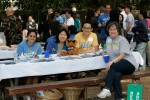Alumni host meetups in California and around the world every summer to prepare incoming students for their first year at UCLA.
These events, called New Bruin Send-offs, give incoming students the opportunity to meet other Bruins in their area, said Amber Buggs, assistant director of the Bruin Recruitment program in UCLA Alumni Association. Any graduate can coordinate a send-off through the UCLA Alumni Association, she added.
The UCLA Alumni Association began the program in 2013, starting with 10 send-offs held mostly in California, Buggs said. Because of their success, over 50 groups of alumni organized events around the world this year.
Lucy Tejeda, an alumna who helped organize the Latino Alumni Association’s send-off Saturday in Torrance, California, said incoming students played Loteria while their parents asked alumni questions.
Many of the students who attended are first-generation students, Tejeda said. Their parents said at the event that they were worried about their children’s safety, treatment and mental health on campus, she added.
“One of the parents brought up that his daughter was concerned about not fitting in or feeling different on campus,” Tejeda said. “Each of the alumni on the panel talked about how we dealt with issues of discrimination, sometimes being the only (Latina) in the classroom.”
The UCLA Alumni Association has helped coordinate an increasing number of send-offs for students of a particular demographic over the past few years with groups such as the Black Alumni Association and the Lambda Alumni Association for lesbian, gay, bisexual, transgender and queer students. Most events, however, are based on where students live.
This year, UCLA alumni worldwide are hosting send-offs for students who live near cities such as Tokyo, Paris and Jakarta, Indonesia. Buggs said these are more formal than send-offs in the United States and focus on helping students adjust to aspects of American culture that may be unfamiliar to them.
Stephanie Brown, an alumna and co-president of the Bay Area Bruins, said the group has been organizing meetups for incoming students since the 1980s and now hosts send-offs with the alumni association.
“We make sure everyone knows where Diddy Riese is,” Brown said. “We tell them ‘leave your car at home.’”
Madelyn Chen, a rising second-year English student, met her future roommate and other students at the Bay Area Bruins event.
“The send-off was our chance to connect,” Chen said. “I doubt we would have met (otherwise).”
She and another incoming student, Brent Lee, took the initiative to meet other Bruins by organizing beach hangouts before and after the alumni-organized send-off.
“Getting my acceptance letter was probably the best thing that could have happened in my life,” Lee said. “But I didn’t know anyone else going (to UCLA).”
Lee, a second-year undeclared student, said the hangouts were more intimate than the send-offs. The send-off showed him how different generations of alumni were fueled by traditions like the crosstown rivalry with the University of Southern California, even as the university has grown with new buildings and new fields of study, he added.
Steve Yu, an alumnus and president of the Los Angeles Westside Network for UCLA alumni, said that because most students in the area are already familiar with UCLA and Los Angeles, the group’s send-offs focus on helping students transition into the college lifestyle.
The group tries to ensure multiple generations of Bruins are present to offer different perspectives to incoming students, Yu said.
Older alumni are able to socialize with parents and younger alumni and current students can answer questions incoming students can’t ask in front of their parents, he added.
“It’s exciting talking to someone who’s made the commitment to come to UCLA because you can say, ‘You made a great choice,’” Yu said. “Having other alumni who are older show up also shows students this is a lifelong journey.”

This is most encouraging because being an international student isn’t easy, given our complex culture and language. Assistance must come from numerous sources to aid these young people embarking on life’s journey. Most struggle in their efforts and need guidance from schools’ international departments, immigration protection, host families, concerned neighbors and fellow students, and informative books to extend a cultural helping hand so we all have a win-win situation.
One such new award-winning worldwide book/ebook that reaches out to help anyone coming to the US is “What Foreigners Need To Know About America From A To Z: How to Understand Crazy American Culture, People, Government, Business, Language and More.” It is used in foreign Fulbright student programs and endorsed worldwide by ambassadors, educators, and editors. It also identifies “foreigners” who became successful in the US and how they’ve contributed to our society, including students.
A chapter on education explains how to be accepted to an American university and cope with a confusing new culture, friendship process and daunting classroom differences. Some stay after graduation. It has chapters that explain how US businesses operate and how to get a job (which differs from most countries), a must for those who want to work with/for an American firm here or overseas.
It also has chapters that identify the most common English grammar and speech problems foreigners have and tips for easily overcoming them, the number one stumbling block they say they have to succeeding here.
Good luck to all wherever you study!